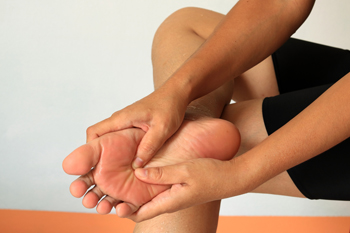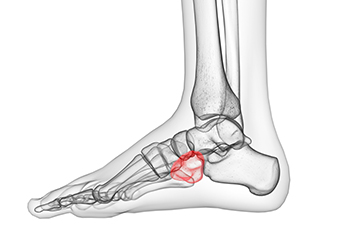Connect With Us
Blog
Items filtered by date: December 2023
Peripheral Neuropathy

Common peroneal nerve dysfunction, also known as common fibular nerve dysfunction, involves damage to the peroneal nerve, affecting movement and sensation in the foot and leg. This condition can occur at any age and is a type of peripheral neuropathy, specifically mononeuropathy, where a single nerve is damaged. Causes can range from knee trauma, fibula fracture, tight casts, habitual leg crossing, to pressure during sleep or surgery. It is also seen in individuals with anorexia, autoimmune conditions, diabetes, alcohol use, or inherited disorders like Charcot-Marie-Tooth disease. Symptoms include decreased sensation, numbness, tingling in the leg, foot dropping, a slapping gait, toe dragging, and muscle weakness. Diagnosis involves a physical exam, electromyography, nerve conduction tests, MRI, and nerve ultrasound. Potential complications may include reduced walking ability and permanent sensation loss or weakness in the legs or feet. If you have symptoms of peripheral neuropathy, it is suggested that you schedule an appointment with a podiatrist to discuss treatment options.
Neuropathy
Neuropathy can be a potentially serious condition, especially if it is left undiagnosed. If you have any concerns that you may be experiencing nerve loss in your feet, consult with Arthur Segall, Jr., DPM from Segall Foot and Ankle. Our doctor will assess your condition and provide you with quality foot and ankle treatment for neuropathy.
What Is Neuropathy?
Neuropathy is a condition that leads to damage to the nerves in the body. Peripheral neuropathy, or neuropathy that affects your peripheral nervous system, usually occurs in the feet. Neuropathy can be triggered by a number of different causes. Such causes include diabetes, infections, cancers, disorders, and toxic substances.
Symptoms of Neuropathy Include:
- Numbness
- Sensation loss
- Prickling and tingling sensations
- Throbbing, freezing, burning pains
- Muscle weakness
Those with diabetes are at serious risk due to being unable to feel an ulcer on their feet. Diabetics usually also suffer from poor blood circulation. This can lead to the wound not healing, infections occurring, and the limb may have to be amputated.
Treatment
To treat neuropathy in the foot, podiatrists will first diagnose the cause of the neuropathy. Figuring out the underlying cause of the neuropathy will allow the podiatrist to prescribe the best treatment, whether it be caused by diabetes, toxic substance exposure, infection, etc. If the nerve has not died, then it’s possible that sensation may be able to return to the foot.
Pain medication may be issued for pain. Electrical nerve stimulation can be used to stimulate nerves. If the neuropathy is caused from pressure on the nerves, then surgery may be necessary.
If you have any questions, please feel free to contact our offices located in Plantation, and Ft. Lauderdale, FL . We offer the newest diagnostic and treatment technologies for all your foot care needs.
Cuboid Fractures and Cuboid Syndrome

Cuboid fractures are rare and occur when the cuboid bone in the foot becomes broken. The cuboid bone is one of the smallest bones in the foot, and when it breaks, it can cause pain and trouble walking. Cuboid syndrome is a condition that is related to the cuboid bone. It happens when the cuboid bone does not move or function properly. This can cause pain on the outer part of your foot and make it hard to walk. Sometimes, cuboid syndrome can occur after a cuboid fracture because the bone may not heal correctly, or may still be out of place. If you have foot pain on the outer side of the foot, it is suggested that you schedule an appointment with a podiatrist to obtain a proper diagnosis and treatment that will help you return to normal activity as quickly as possible.
Cuboid syndrome, also known as cuboid subluxation, occurs when the joints and ligaments near the cuboid bone in the foot become torn. If you have cuboid syndrome, consult with Arthur Segall, Jr., DPM from Segall Foot and Ankle. Our doctor will assess your condition and provide you with quality foot and ankle treatment.
Cuboid syndrome is a common cause of lateral foot pain, which is pain on the outside of the foot. The condition may happen suddenly due to an ankle sprain, or it may develop slowly overtime from repetitive tension through the bone and surrounding structures.
Causes
The most common causes of cuboid syndrome include:
- Injury – The most common cause of this ailment is an ankle sprain.
- Repetitive Strain – Tension placed through the peroneus longus muscle from repetitive activities such as jumping and running may cause excessive traction on the bone causing it to sublux.
- Altered Foot Biomechanics – Most people suffering from cuboid subluxation have flat feet.
Symptoms
A common symptom of cuboid syndrome is pain along the outside of the foot which can be felt in the ankle and toes. This pain may create walking difficulties and may cause those with the condition to walk with a limp.
Diagnosis
Diagnosis of cuboid syndrome is often difficult, and it is often misdiagnosed. X-rays, MRIs and CT scans often fail to properly show the cuboid subluxation. Although there isn’t a specific test used to diagnose cuboid syndrome, your podiatrist will usually check if pain is felt while pressing firmly on the cuboid bone of your foot.
Treatment
Just as the range of causes varies widely, so do treatments. Some more common treatments are ice therapy, rest, exercise, taping, and orthotics.
If you have any questions, please feel free to contact our offices located in Plantation, and Ft. Lauderdale, FL . We offer the newest diagnostic and treatment technologies for all your foot care needs.
Heel Pain Can Indicate a Type of Arthritis

Heel pain is a common complaint, often attributed to factors like wearing improper footwear or overuse. However, it may surprise you to learn that heel pain can also be a subtle signal of arthritis, specifically, ankylosing spondylitis, or AS. This chronic autoimmune condition primarily affects the spine, but it can also extend its reach to peripheral areas, including the heels. AS triggers heightened inflammation throughout the body’s joints and soft tissues, including peripheral joints like the heels, hips, shoulders, fingers, and toes. Heel pain emerges when the inflammatory response targets the heel or its supporting ligaments and tendons. Chronic back pain and spinal rigidity are classic AS symptoms, and may also cause discomfort in the heels. If left untreated, the pain can escalate, leading to severe stiffness and reduced mobility. The precise cause of AS remains unknown, but those with a family history of ankylosing spondylitis or with conditions like Crohn's disease, psoriasis, or ulcerative colitis, seem to be more susceptible. If you are experiencing persistent heel pain in addition to other symptoms, it is suggested that you schedule an appointment with a podiatrist to explore potential underlying causes, and create an effective treatment plan.
Many people suffer from bouts of heel pain. For more information, contact Arthur Segall, Jr., DPM of Segall Foot and Ankle. Our doctor can provide the care you need to keep you pain-free and on your feet.
Causes of Heel Pain
Heel pain is often associated with plantar fasciitis. The plantar fascia is a band of tissues that extends along the bottom of the foot. A rip or tear in this ligament can cause inflammation of the tissue.
Achilles tendonitis is another cause of heel pain. Inflammation of the Achilles tendon will cause pain from fractures and muscle tearing. Lack of flexibility is also another symptom.
Heel spurs are another cause of pain. When the tissues of the plantar fascia undergo a great deal of stress, it can lead to ligament separation from the heel bone, causing heel spurs.
Why Might Heel Pain Occur?
- Wearing ill-fitting shoes
- Wearing non-supportive shoes
- Weight change
- Excessive running
Treatments
Heel pain should be treated as soon as possible for immediate results. Keeping your feet in a stress-free environment will help. If you suffer from Achilles tendonitis or plantar fasciitis, applying ice will reduce the swelling. Stretching before an exercise like running will help the muscles. Using all these tips will help make heel pain a condition of the past.
If you have any questions please contact our offices located in Plantation, and Ft. Lauderdale, FL . We offer the newest diagnostic and treatment technologies for all your foot and ankle needs.
Let the Expert Treat Your Ingrown Toenails
What Seniors Can Do to Prevent Falling

As we age, maintaining balance and preventing falls becomes increasingly paramount for overall well-being. Simple yet effective strategies can significantly reduce the risk of falls among seniors. Maintaining a regular exercise program, focusing on activities that enhance strength, flexibility, and balance, plays a pivotal role in promoting stability. Adequate lighting within living spaces ensures clear visibility and minimizes tripping hazards. Footwear with non-slip soles and proper support is essential in providing a stable foundation. Regular vision check ups contribute to spatial awareness and hazard detection. Home modifications, such as handrails and grab bars, offer additional support in high risk areas like bathrooms. Medication management, including regular reviews of potential side effects and interactions, is vital. Mindfulness while moving, taking deliberate and controlled steps, adds an extra layer of precaution. By incorporating these preventative measures into daily life, seniors can reduce the likelihood of falls and preserve their independence and well-being. The feet can be affected by falling, and it is suggested that you confer with a podiatrist for additional fall prevention techniques.
Preventing falls among the elderly is very important. If you are older and have fallen or fear that you are prone to falling, consult with Arthur Segall, Jr., DPM from Segall Foot and Ankle. Our doctor will assess your condition and provide you with quality advice and care.
Every 11 seconds, an elderly American is being treated in an emergency room for a fall related injury. Falls are the leading cause of head and hip injuries for those 65 and older. Due to decreases in strength, balance, senses, and lack of awareness, elderly persons are very susceptible to falling. Thankfully, there are a number of things older persons can do to prevent falls.
How to Prevent Falls
Some effective methods that older persons can do to prevent falls include:
- Enrolling in strength and balance exercise program to increase balance and strength
- Periodically having your sight and hearing checked
- Discuss any medications you have with a doctor to see if it increases the risk of falling
- Clearing the house of falling hazards and installing devices like grab bars and railings
- Utilizing a walker or cane
- Wearing shoes that provide good support and cushioning
- Talking to family members about falling and increasing awareness
Falling can be a traumatic and embarrassing experience for elderly persons; this can make them less willing to leave the house, and less willing to talk to someone about their fears of falling. Doing such things, however, will increase the likelihood of tripping or losing one’s balance. Knowing the causes of falling and how to prevent them is the best way to mitigate the risk of serious injury.
If you have any questions, please feel free to contact our offices located in Plantation, and Ft. Lauderdale, FL . We offer the newest diagnostic and treatment technologies for all your foot care needs.

